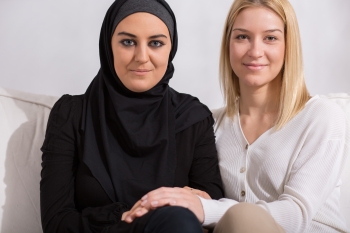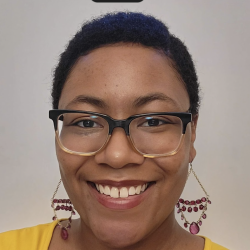
Everybody struggles with cultural sensitivity. You may offer someone pork when they don’t eat it. You may find yourself stumbling to find the correct words or phrase that helps you relate to someone. Or, you may find yourself putting your foot in your mouth because you accidentally said something that wasn’t culturally sensitive and came off as offensive. No one knows exactly what someone else’s life has been like. Every day people will encounter adversities based on their cultural upbringing and difference from others. You may find yourself embarrassed, angry, shut down or silenced. You may also find yourself uncomfortable. Having a deeper understanding of which stage of cultural sensitivity you are in can help minimize the likelihood of discomfort.
Were you raised Jewish, Muslim, Buddhist, Christian? Did you grow up in a rural area, in the city or, in the suburbs? Did you grow up wealthy or poor? Did you grow up with two moms, or with divorced parents? Were your parents swingers? Did you grow up in a Caucasian, Asian, Indian or African American neighborhood? Did you travel as a child, or live in many different locations, or have you never left Philadelphia? The areas of differences that may require cultural sensitivity are endless. All of our experiences and lack of experiences impact our cultural sensitivity for better or worse. This tip on the stages of cultural sensitivity will help you to feel more confident going into a situation that may present itself with a much different background than what you are familiar with.
According to Milton Bennett’s Developmental Model of Intercultural Sensitivity there are six stages that a person must go through to become culturally sensitive: denial, defense, commonality, minimization, cultural awareness, culturally sensitive, relativity, adaptation, and integration.
Knowing and understanding these six stages of cultural sensitivity can empower you to handle yourself in culturally diverse situations with a deeper knowledge and sensitivity to others’ experiences. Taking an honest inventory of yourself throughout the six stages of becoming culturally sensitive can enhance your communication with those around you. Your relationships and interactions with others can be enhanced when you can see other’s worldviews outside of your own. Further, your own worldview may expand and grow by taking in and being open to other’s perspective.
As you review the following six stages of cultural sensitivity, take an honest inventory and reflect on where you think you are in the process.
The Six Stages to becoming more culturally sensitive:
Ethnocentric - These first three stages of cultural sensitivity a person tends to evaluate other people’s cultures based on their own culture.
1. Denial: In the Denial stage you may find only your own beliefs, values, and behaviors to be real. When in the Denial stage you tend to not notice other cultures, or may look at other cultures in a very vague way. For example, someone in this stage would say, “As long as we speak the same language, there’s no problem.” You may differentiate the person as a “foreigner” or “immigrant.” The issue at hand that needs to be looked at is not a refusal to confront the differences, but an inability to perceive the cultural differences that are present on a daily basis. In order to overcome the Denial stage, you must think about and acknowledge the existence of other cultures.
2. Defense: Within the Defense stage, you are able to acknowledge that the differences are there and take one of two directions with your views. You will see your culture as the most evolved or least evolved. The dominant culture (the white male for example) sees the Defense stage as an attack on their values (what the non-dominant culture sees as privileges). People who fall into this category of the Defense stage may say things like “they’re taking our jobs.” People of the non-dominant cultures experience the Defense stage by solidifying their culture as separate from the dominant group. People in the non-dominant group may make statements like “they’ll never understand what we go through, we need to stick together.” Both groups see their own culture in positive stereotypes and the other culture in negative stereotypes.
On the other hand of seeing their culture as most evolved, a person in the Defense stage may view their culture as the subordinate. This culture seeks to become part of the other, “better” culture. People with this stage of Defense may make comments like “these people are so urban and sophisticated, not like the people from home.” Both views have an “us and them” way of thinking.
3. Minimization: People in the minimizer stage may start to categorize the differences into more generalized categories in order to see similarities, for example physical features. You may find yourself saying something like “After all, we’re all human!” Another example of a generalized category is religion, where you may minimize all the different denominations or religions and state “we’re all creatures of God.” You make sense of the differences by categorizing it into one big umbrella category: Religion.
In the Minimization stage, you tend to share your beliefs and behaviors in order to “help” others take on those beliefs, behaviors, and values for themselves. You do not understand that your own beliefs, behaviors, and values are a cultural pattern, but instead you feel they are universal and would be lived by all if they could. Therefore, if someone does not believe, behave, or value in your way, you see it as a lack of skill or that the person is choosing to be different than you.
Ethnorelative- These three stages of cultural sensitivity a person is better able to feel comfortable with many different perspectives and cultures and can even take on some of the other cultures as their own.
4. Acceptance: Within the acceptance stage of cultural sensitivity, a person does not necessarily “agree” with the other worldviews, but they acknowledge the other cultures as having just as much value as the one that they identify with. People in the acceptance stage tend to be more inquisitive towards others, asking many questions to try to understand for themselves, rather than rely on previous prejudices. You might find yourself saying, “I do not eat pork, but that doesn’t mean you do not have to eat pork, as well.”
5. Adaptation: When you are in the Adaptation stage you are able to experience another culture and behave according to what is culturally appropriate. Behaving according to the cultural rules allows you to feel empathy within different contexts. Interacting culturally appropriate within the context of another culture gives you the opportunity to gain new experiences and may change the organization of your lived experiences. These new experiences can give you multiculturality. Adaptation does not mean giving up your own beliefs, behaviors, and values. Instead, you have now added to your original beliefs, behaviors, and values within the different experienced contexts.
The issue that may arise within the Adaptation stage is staying authentic to who you are as a person, despite having experienced different behaviors in different contexts. You may find yourself broadening who you are. You are adapting your original beliefs, behaviors, and values to fit these new experiences. You will be able to recognize and accept differences in cultures and establish specific changes in your own beliefs, behaviors, and values that need to be made in order to work in the different context or with a person with a worldview that is different than yours. However, you still have your original beliefs, behaviors, and values that you started with. You may find yourself saying something like, “I feel I can make a more accurate decision given my multiple frames of reference.”
6. Integration: The last stage of becoming more culturally sensitive is Integration. At this stage you will have the ability to stay true to yourself and your own worldview but also move in and out of different cultures appropriately and easily. You will be able to adapt and take on multiple perspectives within each of these cultures with little to no stress to you or the people within these different cultures due to a marginalized self-identity. You may find that your therapist is integrated, in that s/he can accomodate your culture, mirroring your verbage and referencing your rituals. They may even share with you that they tried something you mentioned in your sessions. And, at the same time, your therapist is able to stay true to themselves in the moment and not become intertwined with you. They may stand strong in their point-of-view in reference to the work you need to do.
The stages go in a continuum. A person may find him or herself being at different stages for different parts of culture. You may not see all of the parts of one specific culture in one experience of that culture. Therefore, it is important to hold onto your own core beliefs, behaviors, and values as a reference and base to organize yourself with the new context.
Reflecting on what stage you are currently acting in can be useful in your day-to-day routine. Giving you a better view of how you may react to the gentleman of different race than you at the coffee shop, or why you snapped at your coworker who is of different gender than you. Acknowledging what stage you are conducting yourself in can also be helpful in becoming more intrinsic. You will have a better understanding of what is happening with your own thoughts and feelings.
Recognizing what stage you are functioning in will give you a greater view of the world at large and where you fall into it. You have the opportunity to feel more at ease with others that you perceive to be different from you. You will feel more confident and know what to expect because you will know your motive. Are you trying to “help” the other culture or understand them? Are you marginalized with them or defending your own culture? Having the answers to these questions through identifying your stage of functioning helps guide your thoughts and interactions.
After identifying your stage of cultural sensitivity, I would ask myself, “am I happy at this stage?” “Am I my best at this stage?” “How do I interact with others in this stage, does that work for me? Does it work for others?” “Could I get a better result from myself and others, if I was responding from a different stage of cultural sensitivity?” All of these questions are great to ask yourself as you interact with others. You’re gaining the deepest understanding from them, and they from you. I would also challenge you to explore what stage the people you are interacting with are in. Giving you an even better appreciation and understanding of the dynamic in the room. Once you have figured out the dynamic between yourself and others, you can begin healthier, more beneficial interactions that move you forward with people, rather than keep you at a stand still or move you backwards.
For your convenience, we have five offices offices and work with clients virtually:
- Ocean City Office 360 West Ave, Floor 1, Ocean City, NJ 08226
- Richmond Office 1806 Summit Ave, Suite 300 #1006, Richmond VA 23230
- Alpharetta Office 11720 Amber Park Drive, Suite 160, Alpharetta GA 30006
- Society Hill Office 233 S. 6th Street, C-33, Philadelphia PA 19106
- Art Museum / Fairmount Office 2401 Pennsylvania Ave, Suite 1a2, Philadelphia PA 19130
- Telemedicine: We have therapists who are licensed to work in Florida, Georgia, New Jersey, Virginia and Pennsylvania
Opening an office soon in Santa Fe New Mexico.
Call 215 922 LOVE and speak with a therapist today.



























